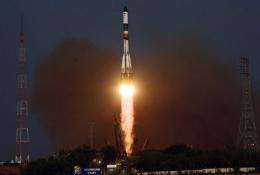A Russian Progress-M-12M cargo ship carrying supplies for the International Space Station (ISS) blasts off from the launch pad at the Baikonour cosmodrome. Russia may delay the next manned launch for the ISS after an unmanned Progress vessel crashed into Siberia instead of reaching orbit, according to a news report.
Russia may delay the next manned launch for the International Space Station (ISS) after an unmanned space vessel crashed into Siberia instead of reaching orbit, a report said Friday.
The planned September 22 launch could be delayed to give specialists time to work out the precise cause of the crash of the Progress cargo vehicle, Interfax-AVN, the specialist military arm of the Interfax news agency, quoted a source in the rocket and space industry as saying.
The planned return to Earth from the ISS of two Russians and an American astronaut on September 8 may also be delayed, said the source, who was not named.
"The experts need time to work out the causes of the failed Progress launch and so it is better to correct the date for the landing and blast-off of the space ships," the source said.
"One possibility is to delay the landing from September 8 to September 22 and the blast-off from September 22 to October 6," it added.
The source said the Soyuz-FG rocket that was due to take the astronauts into space has the same third-stage motor in the Soyuz-U rocket which failed to put the Progress craft in orbit.
Current ISS residents Russians Andrei Borisenko and Alexander Samokutyaev as well as American Ron Garan had been due to return to Earth on a Soyuz TMA-21 capsule on September 8.
Russians Anton Shkaplerov and Anatoly Ivanishin and American Dan Burbank were then due to fly to the ISS on a Soyuz TMA-22 capsule on September 22.
Russia has grounded all its Soyuz rockets pending an investigation into the failed launch and has postponed the launch of a navigation satellite from a Soyuz that was due this week.
Fragments of the Progress crashed into the Siberian region of Altai, raising fears about the effect on the environment and health of locals as it was carrying one-and-a-half tonnes of highly toxic fuel.
The failed launch was a spectacular blow for Russia which had proudly become the sole nation capable of taking humans to the ISS after the July withdrawal of the US space shuttle.
(c) 2011 AFP




















